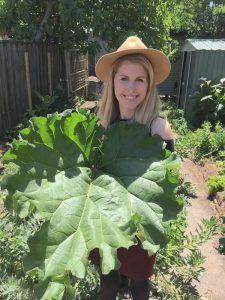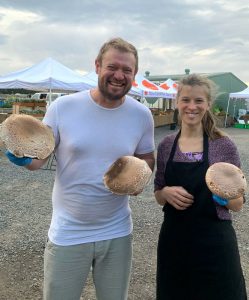Ann interviews Morgan Koegel, from 3000acres
 If you have any involvement in any community garden in Melbourne then, more likely than not, you have directly or indirectly benefited from some actions by 3000acres in the past. If you haven’t heard of 3000acres, then you’re not really reading this newsletter properly – they have had a regular monthly column for the past year. And if you have come across 3000acres, then you’ve probably also come across its General Manager, Morgan Koegel. Ann Stanley has now interviewed Morgan about her background, the state of urban agriculture in Melbourne and about what’s living and growing in her backyard in Northcote. Her interview writeup is entitled “helping more people grow more food in more places“.
If you have any involvement in any community garden in Melbourne then, more likely than not, you have directly or indirectly benefited from some actions by 3000acres in the past. If you haven’t heard of 3000acres, then you’re not really reading this newsletter properly – they have had a regular monthly column for the past year. And if you have come across 3000acres, then you’ve probably also come across its General Manager, Morgan Koegel. Ann Stanley has now interviewed Morgan about her background, the state of urban agriculture in Melbourne and about what’s living and growing in her backyard in Northcote. Her interview writeup is entitled “helping more people grow more food in more places“.
Here’s how Morgan introduces 3000acres: “We’re looking at creating healthy, more resilient, communities right across Melbourne in urban and peri-urban areas with different council areas for different clients. So that’s everything from starting a new community garden, through helping community groups get incorporated, to community composting, workshops and education. The projects are diverse but they all have the central mission of making urban agriculture and growing food in urban areas an ordinary part of everyday life.“
And here is the attitudinal shift that Morgan is pushing: from “I live here and farming happens over there” to “Maybe I should have some meaningful interactions with farming that informs the food that I buy and how much I pay for it“.
Robin on shade cloth
Shade cloth structures, whether temporary or permanent, are likely to be ever more necessary for home gardeners as we experience more heat waves, and high temperature days, than ever before. Even a single day of scorching heat can do irreversible damage to our edible gardens.
Temporary shade cloth structures can be erected by hammering four star pickets into each corner of a garden bed, draping them with shade cloth (or even an old sheet), and securing the cloth with yellow star picket caps. In this case, what you use is not especially important.
However, if you are erecting a permanent structure, choosing the right type of shade cloth for your circumstances is important. There are four criteria to consider: knitted or woven; density; colour; and aesthetics.
In Robin Gale-Baker’s full version of this article, she then goes on to discuss each of these criteria and which options suit which circumstances. Read Robin’s full article.
A new local mushroom seller – Urban Farming Collective
 The Urban Farming Collective, who are based in Preston, sell mushrooms that they grow in their backyard in their urban farm. The species include Swiss brown, white button and oyster mushrooms. They also sell mushroom kits. They also go foraging for highly prized wild mushrooms like pines and morels. You can buy their mushrooms at Alphington Farmers’ Market and the Vegan Market of Melbourne. Read their Local Food Directory page. Welcome, Simon and Miriam!
The Urban Farming Collective, who are based in Preston, sell mushrooms that they grow in their backyard in their urban farm. The species include Swiss brown, white button and oyster mushrooms. They also sell mushroom kits. They also go foraging for highly prized wild mushrooms like pines and morels. You can buy their mushrooms at Alphington Farmers’ Market and the Vegan Market of Melbourne. Read their Local Food Directory page. Welcome, Simon and Miriam!
There are now 5 local mushroom growers in the Local Food Directory
Milk from farms where the male calves aren’t killed
A few weeks ago, I discussed how most male calves in dairy herds are deemed surplus to requirements and killed shortly after birth – around 500,000 calves per year in Australia.
There are several ways that dairy farms can avoid this slaughter.
One way, previously discussed, is the use of ‘sexed semen’ such that all the calves are female and can, in time, join the dairy herd. This is the approach of the How Now farm and you can read about their approach on their website.
Another way is simply to keep the male calves and let them live out their lives. This is the approach of the Mother Cow Dairy and you can read about their philosophy on their website. I spoke with the farmer at Mother Cow Dairy and he said that his philosophy comes from his Hinduism, in which cows are considered sacred. [Editor’s note: when I emigrated from the UK, I was really surprised that many of the Indian restaurants here serve beef, something that didn’t happen in the UK.]
You can buy the Mother Cow Dairy milk at: Apples And Sage Organic Wholefoods, Balwyn; Arora Spices, Brunswick East; Ashok’s Bombay Supermarket, Blackburn South; Bombay Music And Cafe, Box Hill South; Colonial Fruit Co, Forest Hill; Colonial Fresh Market, Doncaster; Foodworks, Fitzroy; Indian Spice And Organics, Balwyn North; Little Vegetable, Ivanhoe East; P & C Groceries, Epping; Shoppers India, Hawthorn; Shri Ram Groceries, Reservoir; Shri Ram Groceries, Thomastown; Shriji Grocery, Mill Park; Strawberry Point, Forest Hill; Wholefood Merchants, Greensborough; and Wild Things Food, Fitzroy North.
As previously reported, you can buy How Now’s milk at: Boccaccio SUPA IGA, Balwyn; Cannings Butchers, Hawthorn; Cannings Butchers, Kew; Ceres Fair Food, Preston; Eastfield Natural Foods, Croydon South; Fredricks Grocer, Richmond; Mt Evelyn IGA; Natures Harvest, Hurstbridge; Paul’s IGA Ringwood; Quinton’s SUPA IGA, Warrandyte; Rhubarb Rhubarb Organics, Preston; St Andrews General Store; SUPA IGA, Brunswick; and The Vegetable Connection, Fitzroy.
So, you can now buy ethically produced milk if you live in any of the following suburbs: Balwyn, Balwyn North, Blackburn South, Box Hill South, Brunswick, Brunswick East, Croydon South, Doncaster, Epping, Fitzroy, Fitzroy North, Forest Hill, Greensborough, Hawthorn, Hurstbridge, Ivanhoe East, Kew, Mill Park, Mt Evelyn, Preston, Reservoir, Richmond, Ringwood, St Andrews, Thomastown and Warrandyte.
Thanks to Carrie Newbold for telling me about Mother Cow Dairy.
Yes, you did know!
Last week, we asked if anyone knew about any classes or workshops on maintaining goats.
Pauline Webb has responded that Sylvia Allen, wife of Pete the Permie, knows all about goats. I've spoken to Pete and he agrees with Pauline and says that people are more than welcome to ring Sylvia and himself to ask their questions. Phone number: 0418 665880.
Fay Loveland has responded to point out that PIP magazine has published a podcast interview with Maria Cameron about keeping goats in a shared backyard context. Maria is from Hibi Farm in Heidelberg West, where she shares some goats with some of her neighbours.
We also asked if there were any facilities for recycling corks? Lucinda Flynn has responded to say that, whilst they no longer get collected for the zoos, they are fine to put into the compost.
Thanks Pauline, Fay and Lucinda!
Do you know?
Marsha Merory asks if there is anyone who could install and manage a beehive for her in exchange for most of the honey. She lives in Ivanhoe East.
Susie Scoullar asks: how does one make black garlic and where can it be bought locally?
Ann Stanley asks:
- Are micro-greens grown from special seeds or are they just densely planted and therefore stunted shoots of normal seeds?
- Are micro-greens more nutritious than ‘macro’ greens and, if so, why?
- Is anaerobic worm/compost/weed ‘tea’ good or bad for the soil? Some people go to a lot of trouble keeping it aerobic; some people say the foul smell of the anaerobic stuff is the nitrogen being lost to the air; others say it doesn’t matter whether it’s anaerobic or not; etc.
Email me with any answers and I’ll pass them on to the relevant questioner.
Another collector of bee swarms
Ben Wrigley, Eltham, 0418 212433.
Thanks for the heads up, Julie French!
That brings the total number of local bee swarm collectors listed on our website to 22.
What seeds to plant in December
Here is a list (see the planting guide for more detail):
Warm season veggiesBeans |
Leafy greensLettuce |
RootsBeetroot |
PerennialsAsparagus |
December is not a very good planting month: arguably too late for many summer veggies and, although you can plant leafy greens such as lettuce and mustard greens, they are likely to go to seed pretty quickly.
 Carrot man
Carrot man
Newsletter reader Cath Jones met ‘carrot man‘ in Bourke Street a few weeks ago and took this picture. Apparently he is becoming something of a celebrity for being out there in public carrying an enormous carrot and making people smile. And he has been doing it for the past six years!
A video from Community Grocer
As part of The Environment Film Festival Australia, The Community Grocer recently published a short video (3 minutes) about what they do.
Which link was clicked most times in the last newsletter?
The picture of the cranky (or terrified?) capsicums.
Proverb of the month
 Take the gilt off the gingerbread. Meaning: remove an item’s most attractive qualities. Gingerbread was originally a form of simple cake flavoured with ginger and treacle. Gilt means a thin covering of gold leaf (with gilded being the adjective). In festivals during the Middle Ages, gingerbread cakes were apparently sometimes gilded to make them seem more special (gold is harmless when eaten in small quantities). So, as a corollary, gingerbread without gilt can be viewed as a rather humble offering. Hence the phrase.
Take the gilt off the gingerbread. Meaning: remove an item’s most attractive qualities. Gingerbread was originally a form of simple cake flavoured with ginger and treacle. Gilt means a thin covering of gold leaf (with gilded being the adjective). In festivals during the Middle Ages, gingerbread cakes were apparently sometimes gilded to make them seem more special (gold is harmless when eaten in small quantities). So, as a corollary, gingerbread without gilt can be viewed as a rather humble offering. Hence the phrase.
Gardening quote of the month
“My garden is my most beautiful masterpiece.” by Claude Monet.
Joke of the week
Why did the potato cross the road? Because he saw a fork up ahead.
New events – not cooking
Beeswax food wraps: Wednesday, 4th December, 10.15-11.15am and again at 11.30am-12.30pm; Brunswick Library.
What: Ever wanted a reusable, sustainable alternative to clingwrap and plastic zip-lock bags? Beeswax wraps, made from fabric and beeswax, are an alternative to one-use plastics. Wrap sandwiches, snacks and other items, cover bowls and plates. You can even fold them over containers and use them again and again! Learn what fabrics to use, where to buy beeswax, and how to create your own reusable food wraps at home.
Cost: free.
Bookings: EventBrite.
Summer fruit tree pruning workshop: Saturday, 7th December, 9.30am-12.30pm; Richmond.
What: Led by Chris England. Using the demonstration fruit trees in the orchard of the Burnley Gardens, you will learn how to summer prune fruit trees to get maximum fruit and also how to get fruit on espalier fruit trees. This is a small group workshop, where you will ‘have a go’ under an expert’s watchful eye.
Cost: $65.
Bookings: TryBooking.
Myo produce bags with Lisa Moore: Saturday, 7th December, 1-4pm; Heidelberg West.
What: Lisa Moore will teach you how to make your own produce bags.
Cost: $17.
Bookings: EventBrite.
Note that most organisations are not yet advertising any of their 2020 events. Those that are known to us can be found on our website non-cooking calendar.
New events – cooking
Note that most organisations are not yet advertising any of their 2020 events. Those that are known to us can be found on our website cooking calendar.
Summary of upcoming events – not cooking
Over the next week
- Growing fruit trees: Wednesday, 27th November, 7-9pm; Manningham Civic Centre.
- The art of espalier: Thursday, 28th November, 6.30-9pm; Bulleen Art and Garden.
- Composting workshop: Saturday, 30th November, 9.30am-1.30pm; Brunswick Neighbourhood House.
- Demonstrating effective blackberry control techniques: Saturday, 30th November, 10-midday; Smiths Gully.
- Bees wax wraps: Saturday, 30th November, 10am-midday; Mount Evelyn.
- Edible weeds walk: Saturday, 30th November, 10.30am-12.30pm; Brunswick East.
- Edible weeds walk: Saturday, 30th November, 1.30-3.30pm; Brunswick East.
- Say hello to the Melbourne Arboretum: Sunday, 1st December, 11am-1pm; Mernda.
Over the next month
- Beeswax food wraps: Wednesday, 4th December, 10.15-11.15am; Brunswick Library.
- Beeswax food wraps: Wednesday, 4th December, 11.30am-12.30pm; Brunswick Library.
- The joy of backyard chooks: Thursday, 5th December, 6.30-9pm; Bulleen Art and Garden.
- Native plants for food and medicine: Saturday, 7th December, 9.30am-12.30pm; Bulleen Art and Garden.
- Summer fruit tree pruning workshop: Saturday, 7th December, 9.30am-12.30pm; Richmond.
- Wicking bed workshop: Saturday, 7th December, 10am-midday; Brunswick Neighbourhood House.
- Myo produce bags with Lisa Moore: Saturday, 7th December, 1-4pm; Heidelberg West.
- Tomatoes and more – tomatoes in your edible garden: Saturday, 7th December, 2-3.30pm; Bee Sustainable, Brunswick East.
- Christmas beeswax wrap gift and wrap rejuvenation: Saturday, 7th December, 2-4pm; Central Ringwood Community Centre.
- Summer fruit tree maintenance: Sunday, 8th December, 9.30am-12.30pm; Bulleen Art and Garden.
- Lasagne garden to food forest workshop: Sunday, 8th December, 10am-1pm; Edible Hub, Hurstbridge.
- Sustainable gardening: Thursday, 12th December, 11.30am-12.30pm; Fawkner Library.
- Garlic braiding with Farmer Incubator: Saturday, 14th December, 10am-midday; Yarrambat.
- Bee hive tour: Saturday, 14th December, 10.30am-12.30pm; Yarrambat.
- Diamond Creek Christmas lunch: Wednesday, 25th December, midday-3pm; Uniting Church, Diamond Creek.
Summary of upcoming events – cooking
Over the next week
- Cooking master class – ‘Christmas faves’: Thursday, 28th November, 7-9pm; Gourmet Living, Templestowe.
- Dairy and kombucha fermentation class: Friday, 29th November, 11am-12.30pm; Dixons Creek.
- Mediterranean Summer feast: Friday, 29th November, 6-8pm; Surrey Hills.
- Cook Indian by the creek: Friday, 29th November, 6.30-8.30pm; Diamond Creek.
- Fermented beverages: Saturday, 30th November, 10am-midday; CERES, Brunswick East.
- Amazake making and cooking: Saturday, 30th November, 11am-1.30pm; Preston.
- Sourdough bread and pumpkin damper making: Saturday, 30th November, 1.30-2.30pm; Macleod Organic Community Garden.
- Vegan cheese making with Nase Supplitt: Sunday, 1st December, 10am-3pm; CERES, Brunswick East.
- Shio koji making and cooking: Sunday, 1st December, 11am-1.30pm; Preston.
Over the next month
- No Waste Cook Club: Saturday, 7th December, 10am-midday; Fitzroy North.
- Wild fermentation class (pickling and sauerkraut): Saturday, 7th December, 10am-12.30pm; Dixons Creek.
- Truffle workshop at Ratio Cocoa Roasters: Saturday, 7th December, 10.30am-midday; Fawkner Library.
- Fermentation veg ferments and cultured condiments: Sunday, 8th December, 10am-2pm; CERES, Brunswick East.
- Creative Chinese vegetarian cooking: Sunday, 8th December, 1.30-3pm; Watsonia Library.
- Christmas gingerbread house demonstration: Monday, 9th December, 10.30-11.30am; Watsonia Library.
- Cookie cake and fondant cookies with Emelia Jackson: Tuesday, 10th December, 7-9pm; Gourmet Living, Templestowe.
- Stress free Christmas cooking (thermomix): Tuesday, 10th December, 7.30-9pm; Kilsyth.
- Cookie cake and fondant cookies with Emelia Jackson: Wednesday, 11th December, 7-9pm; Gourmet Living, Templestowe.
- Christmas hors d’oeuvres: Friday, 13th December, 10.30-11.30am; Eltham Library.
- Gingerbread house workshop: Saturday, 14th December, 9.30am-midday; Kinglake.
- Preserving the season’s harvest: Saturday, 14th December, 10am-2pm; CERES, Brunswick East.
- Christmas cupcake decorating workshop: Saturday, 14th December, 1-3pm; Chirnside Park.
